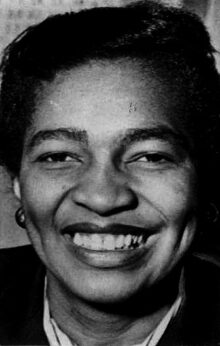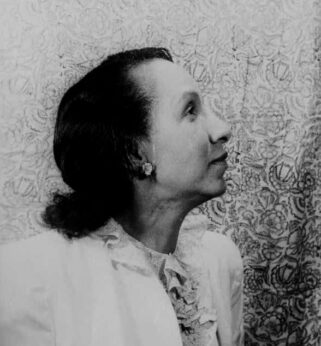
In honor of African American History Month, the fourth and fifth article in our series on the Communist Party’s 90th anniversary will survey a few documents written by leading African American women party members in the struggle against racism. The survey will be divided into two separate articles.
The first article will limit its focus to two documents discussed in 1949 and 1960. The second article will focus on two documents from 1967 and 1973.
The first document we will look at is from 1949. It comes from the June issue of Political Affairs, the theoretical journal of the Communist Party, USA. The article, “An End to the Neglect of the Problems of the Negro Women!,” is by Claudia Jones.

Jones started her activist career at an early age. While in junior high, she received the Theodore Roosevelt Award for Good Citizenship. Shortly after graduating high school, she joined the Communist Party and in 1941 became the National Director of the Young Communist League. By 1948, she was elected to the CP’s National Committee and became Negro Affairs editor for the Daily Worker. During the McCarthy era, she was arrested numerous times; in 1955 she was deported and was given asylum in the United Kingdom, where she joined the British Communist Party. While in Britain she defended the rights of the Afro-Caribbean community, founded and edited the West Indian Gazette, and the Notting Hill Carnival, the second largest street festival in the world. Jones died on Christmas Eve 1964. She is buried next to Karl Marx.
In her article, Jones wrote, “Negro women are the real active forces – the organizers and workers – in all the institutions and organizations of the Negro people. These organizations play a many-sided role, concerning themselves with all questions pertaining to the economic, political, and social life of the Negro people, and particularly of the Negro family.”
Long before the civil rights and feminist movements of the 1960s and ’70s Jones was addressing issues of gender and race, and fighting for the full participation of African American women in every aspect of life. In a male-dominated world, she boldly highlighted the work of women, especially African American women.
However, she placed the burden foremost on the shoulders of communists to lead the fight for equality. She wrote, “Our Party, based on its Marxist-Leninist principles, stands foursquare on a program of full economic, political, and social equality for the Negro people and of equal rights for women. Who, more than the Negro women, the most exploited and oppressed, belongs in our Party?”
Additionally, she wrote, “A developing consciousness on the women question today, therefore, must not fail to recognize that the Negro question in the United States is prior to, and not equal to, the women question; that only to the extent that we fight all chauvinists expressions and actions as regards the Negro people and fight for the full equality of the Negro people, can women as a whole advance their struggle for equal rights.”
As is apparent, Jones is arguing that the struggle against racism will advance all other struggles, including the struggle for the full equality of women.
She continues, “For the progressive women’s movement, the Negro women, who combines in her status the worker, the Negro, and the women, is the vital link to this heightened political consciousness.”
The second document we will look at is from June 1960; it also comes from Political Affairs. “A Cup of Coffee, Please!,” by Shirley Graham Du Bois, addresses the issue of Jim Crow segregation at Woolworth.

Graham Du Bois, who is sometimes overshadowed by her second husband W.E.B. Du Bois, started her activist career at an early age also. She wrote her first article to an Indianapolis paper when she was 13; the article was about the racist swimming policies at the local YMCA swimming pool. While in school at Oberlin College she wrote a three-act, sixteen-scene opera titled Tom-Toms: An Epic of Music and the Negro, which opened at Cleveland Stadium in 1932 drawing a crowd of 10,000; the second performance drew 15,000. Graham became the first African-American woman to write and produce an opera with an all-black cast. After college, Graham worked as the Field Secretary for the NAACP, she wrote a few books (biographies of Dr. George Washington Carver, Paul Robeson, and Fredrick Douglass), helped found the Progressive Party of America (she gave the keynote address to 12,000 people at the Progressive Party’s 1948 convention), and eventually joined the Communist Party. During the McCarthy era, the Du Bois’ were both hounded by the FBI because of their affiliation with the Communist Party. In addition to the above, Graham Du Bois also helped found Freedomways magazine, a broad-left cultural journal of black liberation. Graham Du Bois died in China in 1977.
Graham Du Bois’ article provides a rare glimpse into the times, a first-hand account. It starts, “Four months have passed since four college freshmen walked into a Woolworth store, sat down at the lunch counter and so started a truly mass movement which has swept the nation.” Woolworth at this time was segregated, and the four freshmen were African American.
Graham Du Bois continues, “Since the first of February young Negros have been “sitting down” throughout the South. They have quietly walked into Luncheonettes, Public Libraries, Public Recreation Centers, and even Churches clearly known to be “For Whites Only.”
Graham Du Bois methodically outlines the events as they unfolded; she details the impact on businesses in the area; she connects the dots between the “sit down” strikes and the bus boycotts; she details the role of the NAACP and other organizations in the defense campaigns; as well as the role of the state’s repressive apparatus.
As far as the latter is concerned, she writes, “In South Carolina, 400 demonstrating students were rounded up by club-swinging policemen and armed citizens who had been hastily “deputized” by the police. The students were herded into barbed-wire stockades surrounded by jeering, taunting whites.”
Graham Du Bois adds with a sense of optimism, “Talking to students on their campuses in the South one senses their deep satisfaction in the fact that they are now actively engaged in “breaking down the walls.” They want no more “fact-finding committees.” “We know the facts,” they say, “everybody knows the facts. We are concerned with change.”
The fifth article will survey documents from Esther Jackson and Charlene Mitchell.










